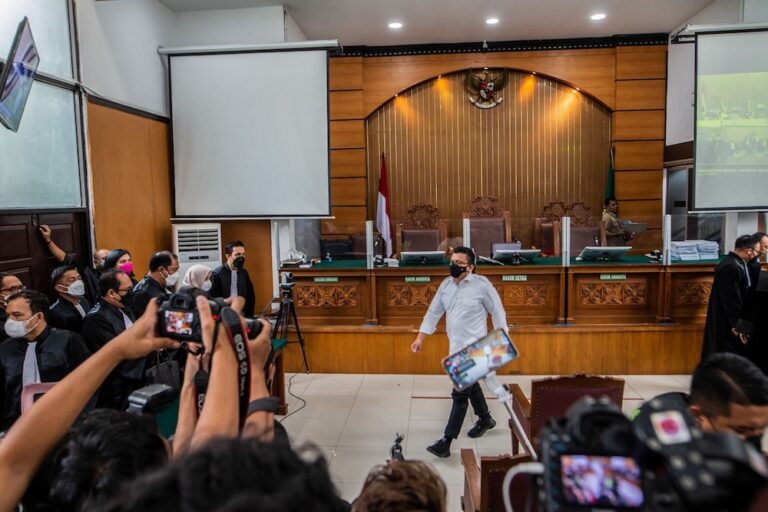(AJI/IFEX) – In response to the latest developments in the court case against “Playboy Indonesia” editor, Erwin Arnada, on trial since 7 December 2006, for distributing indecent pictures to the public and making money from them, AJI: 1. Condemns the acts of intimidation and threats of violence by a group of court visitors against members […]
(AJI/IFEX) – In response to the latest developments in the court case against “Playboy Indonesia” editor, Erwin Arnada, on trial since 7 December 2006, for distributing indecent pictures to the public and making money from them, AJI:
1. Condemns the acts of intimidation and threats of violence by a group of court visitors against members of the court apparatus, who were carrying out their duties. The acts included: making noise in the courtroom, interrupting or protesting judges’ statements, voicing inappropriate words in the courtroom, giving orations or reading petitions in the courtroom and yelling outside the courtroom, which disrupted the trial proceedings.
2. Regrets the acts of omission by the police, who were assigned to keep order during the trial, and that no efforts to enforce the law were made against those who had disturbed the trial proceedings. If police allow the hearing to be terrorized, it means that they are participating in undermining judicial power. AJI also regrets that the judicial panel in the case of “Playboy” magazine was apparently not resolute in responding to the dissatisfaction of some court visitors. Acts threatening prosecutors, defendants and witnesses during the trial proceedings need not happen if the judicial panel is resolute and enforces judicial independence. As stipulated by the law, the panel of judges can order court visitors who are impolite to leave or ask police officers to arrest those who create disturbances in courtroom.
3. Urges leaders of certain mass organizations to provide a good example and demonstrate a sympathetic attitude in expressing their views before the public. Indonesia is a state of law, which is based on Pancasila (philosophical basis of the Indonesian state) and the 1945 Constitution, where the freedom to express opinions is regulated and does not harm the rights of other citizens, much less cause fear and insecurity.
4. Calls on press colleagues covering the trial of “Playboy” to perform their duty in accordance with existing professional ethics. Covering both sides of a story, and being objective, critical and non-judgmental are the prerequisites of high-quality coverage, which is wanted by the public. AJI urges all journalists to improve their professionalism and defend the independence and freedom of the press from the threats of any party.
The position of the Alliance of Independent Journalists (AJI) Indonesia in the case of “Playboy”:
Indonesia is a democratic country, which is based on the law, where the differences in opinion and belief should be solved peacefully and based on legislation. The Indonesian press is a part of democratic reality, plurality and legal mechanisms.
“Democratic” means that all parties have the equal right and opportunity to improve themselves (regardless of their religion, race, ethnicity, faith or ideology) and recognize the differences that exist within a community. “Playboy” magazine, like other publications such as “Tempo” (news), “Sabili” (Islam), “TSM” (military), “F1 Racing” (automotive), “Kosmopolitan” (lifestyle) and “Penyebar Semangat”, (Javanese culture), [vs: Tempo magazine (news), Sabili magazine (Islam), TSM magazine (military), F1 Racing magazine (automotive), Kosmopolitan magazine (lifestyle), or Penyebar Semangat (Javanese culture), has the equal right to exist and opportunity to improve. The only thing that can kill a publication is having no readers. But it should not be killed under the name of ”dislike” or differences in beliefs. A similar principle is applied to newspapers and television and radio stations across Indonesia.
“Based on law” means that all publications in Indonesia must obey legal procedures and have equal position before the law. As long as “Playboy” magazine meets existing legal requirement (business publication permit), there is no reason for any party to shut it down or punish its management. Since 1999, Indonesia has had the Law Number 40 on the Press, which guarantees press freedom and the public’s right to information. The press can be punished if it is used to commit crime or if the management of a media outlet commits a crime. However, punishing a media outlet’s management for the content of its product is an effort to criminalize the press, which violates the spirit of democracy and press freedom.
Based on the legal guidance of the previous Press Council, AJI sees “Playboy” as a product of the press, hence all objections to the content of the publication can be expressed through the right to reply or make correction, or by reporting it to the Press Council.
AJI has also asked the management of “Playboy Indonesia” to comply with the Press Council’s guideline to limit the distribution of the magazine to its targeted audience and to bear in mind the socio-cultural aspects of the Indonesian people, particularly when it comes to protecting minors, in its distribution strategies.
AJI is of the view that dislike of a certain product of the press, whatever its theme or focus, cannot be used as a reason to crack down on or punish the management of the media concerned. There are still many ways, peaceful and civilised, to censure the media without resorting to violence and intimidation.


